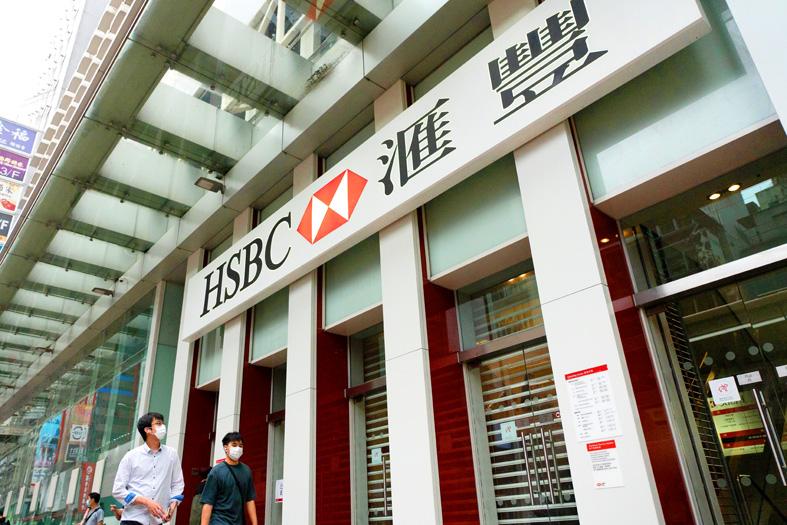HSBC Bank Taiwan Ltd (匯豐台灣商銀) holds an upbeat outlook about the growth of sustainability-linked loans (SLL), because higher electricity rates would provide a new incentive for companies to reduce power use, the bank told the Taipei Times in an interview.
The higher electricity rate took effect yesterday.
The amount of SLLs approved by HSBC Bank Taiwan grew eight times year-on-year in the first half of this year, the bank said without disclosing the figure.

Photo: Bloomberg
SLLs are different from regular corporate loans in that the debtor needs to set a few targets related to its environment, social and governance (ESG) practices with the bank and if the debtor meets the targets, it would be granted rewards such as discounts on the interest rate.
HSBC Bank Taiwan usually requires its clients that hope to take out a SLL to set three targets and at least 80 percent of the targets are related to environmental issues, such as power consumption and waste water management, commercial banking head Stanley Hsiao (蕭仲程) said in the interview.
With the electricity rate for heavy industrial users rising 15 percent yesterday, many companies would be incentivized to review their manufacturing processes to see whether there is room for reducing power use to save on electricity bills, Hsiao said.
SLLs would be suitable for these firms, as they could set targets for power conservation and once they meet the targets, they would obtain financial rewards, he said.
Although SLLs are often associated with green loans, the two types of loans are fundamentally different because the bank does not restrict the use of the proceeds of SLLs to environmental projects, Hsiao said.
SLLs are more like short-term corporate loans and perhaps because of the comparative flexibility in the use of the funds, they have expanded more rapidly than green loans worldwide, he said, adding that the growth rate is 400 percent to 800 percent.
“Among all our funding linked with the ESG concepts, green loans make up about only 10 percent, while SLLs account for about 80 percent,” Hsiao said.
Meanwhile, HSBC Bank Taiwan is considering reviewing its SLL mechanism to encourage corporate clients to set more challenging targets, he said.
“Currently, one year after we approve the loan, we review whether the debtor has met the targets, but we are also thinking about more challenging targets that might not be reached in one year,” Hsiao said.

With an approval rating of just two percent, Peruvian President Dina Boluarte might be the world’s most unpopular leader, according to pollsters. Protests greeted her rise to power 29 months ago, and have marked her entire term — joined by assorted scandals, investigations, controversies and a surge in gang violence. The 63-year-old is the target of a dozen probes, including for her alleged failure to declare gifts of luxury jewels and watches, a scandal inevitably dubbed “Rolexgate.” She is also under the microscope for a two-week undeclared absence for nose surgery — which she insists was medical, not cosmetic — and is

GROWING CONCERN: Some senior Trump administration officials opposed the UAE expansion over fears that another TSMC project could jeopardize its US investment Taiwan Semiconductor Manufacturing Co (TSMC, 台積電) is evaluating building an advanced production facility in the United Arab Emirates (UAE) and has discussed the possibility with officials in US President Donald Trump’s administration, people familiar with the matter said, in a potentially major bet on the Middle East that would only come to fruition with Washington’s approval. The company has had multiple meetings in the past few months with US Special Envoy to the Middle East Steve Witkoff and officials from MGX, an influential investment vehicle overseen by the UAE president’s brother, the people said. The conversations are a continuation of talks that

CAUTIOUS RECOVERY: While the manufacturing sector returned to growth amid the US-China trade truce, firms remain wary as uncertainty clouds the outlook, the CIER said The local manufacturing sector returned to expansion last month, as the official purchasing managers’ index (PMI) rose 2.1 points to 51.0, driven by a temporary easing in US-China trade tensions, the Chung-Hua Institution for Economic Research (CIER, 中華經濟研究院) said yesterday. The PMI gauges the health of the manufacturing industry, with readings above 50 indicating expansion and those below 50 signaling contraction. “Firms are not as pessimistic as they were in April, but they remain far from optimistic,” CIER president Lien Hsien-ming (連賢明) said at a news conference. The full impact of US tariff decisions is unlikely to become clear until later this month

Nintendo Co hopes to match the runaway success of the Switch when its leveled-up new console hits shelves on Thursday, with strong early sales expected despite the gadget’s high price. Featuring a bigger screen and more processing power, the Switch 2 is an upgrade to its predecessor, which has sold 152 million units since launching in 2017 — making it the third-best-selling video game console of all time. However, despite buzz among fans and robust demand for pre-orders, headwinds for Nintendo include uncertainty over US trade tariffs and whether enough people are willing to shell out. The Switch 2 “is priced relatively high”